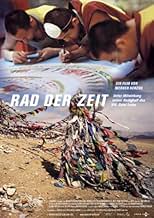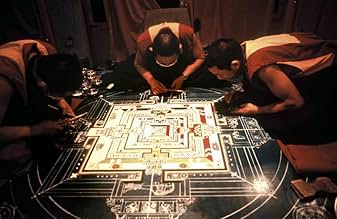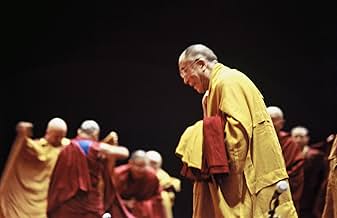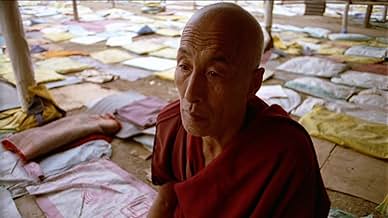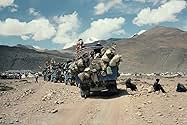NOTE IMDb
7,1/10
2,8 k
MA NOTE
Ajouter une intrigue dans votre langueWheel of Time is Werner Herzog's photographed look at the largest Buddhist ritual in Bodh Gaya, India.Wheel of Time is Werner Herzog's photographed look at the largest Buddhist ritual in Bodh Gaya, India.Wheel of Time is Werner Herzog's photographed look at the largest Buddhist ritual in Bodh Gaya, India.
- Réalisation
- Scénario
- Casting principal
Avis à la une
Famed German filmmaker Werner Herzog and his crew travel to a Buddhist pilgrimage site in Bodgaya, India. There they film the believers as they do the many tasks that they feel lead to greater enlightenment. The film's title is about a sand drawing or a 'mandala' that is created for this event.
While my summary is pretty much true of all films, it's especially true of "Wheel of Time". If you have no interest in Buddhism or don't like documentaries that are light on narration and thorough explanations, then you'll probably not enjoy this film. This isn't meant pejoratively--it's just that your interests will really have a lot to do with whether I'd recommend it to you. As a retired history teacher who often taught about world religions, I already had a reasonable understanding of many of the tenants of Buddhism as well as an interest in learning more. But I am NOT the typical person. And, I don't mind the vagueness in the narrative of this film very much--though I would have appreciated it if the film had talked about the basic beliefs of the religion. In other words, before attempting a discussion of the confusion topic of 'mandalas' (something which, it appeared, even the Dalai Lama had a hard time explaining in the film), perhaps it would have been best to discuss other aspects of the religion.
Things of interest to watch for would include the vat of tea (that's a lotta tea!), the great lengths to which some of the followers go to get there, the anticlimactic aspects of the pilgrimage and the later visit to Graz, Austria. Not for all tastes, but worth seeing if it is yours.
While my summary is pretty much true of all films, it's especially true of "Wheel of Time". If you have no interest in Buddhism or don't like documentaries that are light on narration and thorough explanations, then you'll probably not enjoy this film. This isn't meant pejoratively--it's just that your interests will really have a lot to do with whether I'd recommend it to you. As a retired history teacher who often taught about world religions, I already had a reasonable understanding of many of the tenants of Buddhism as well as an interest in learning more. But I am NOT the typical person. And, I don't mind the vagueness in the narrative of this film very much--though I would have appreciated it if the film had talked about the basic beliefs of the religion. In other words, before attempting a discussion of the confusion topic of 'mandalas' (something which, it appeared, even the Dalai Lama had a hard time explaining in the film), perhaps it would have been best to discuss other aspects of the religion.
Things of interest to watch for would include the vat of tea (that's a lotta tea!), the great lengths to which some of the followers go to get there, the anticlimactic aspects of the pilgrimage and the later visit to Graz, Austria. Not for all tastes, but worth seeing if it is yours.
`Wheel of Time' is a very good film, but I admit that it is different from what I expected from Herzog. He is still very talented, but I doubt if the subject matter is best suited to him. `Wheel of Time' concerns many things, including religion, virtue, and faith, which in this case may not be the best subjects for Herzog. But when `Wheel of Time' deals with some strange and crazy rituals, political oppression, and rugged landscapes, these parts of the film are very satisfying.
Some scenes in `Wheel of Time' are magical, especially the scenes which show vast landscapes and people performing strange rituals. Those scenes are Herzogian, I think. Nobody does this kind of thing better than Herzog. If a cinephile watches these scenes, not knowing who shot them, he or she will guess correctly that they were shot by Herzog. These scenes make `Wheel of Time' rise way above television documentaries.
But other scenes are not as magical as I expect from Herzog's films. I think that maybe the religious subject matter of this film doesn't allow Herzog to be as playful in directing as he was in other films. It is very difficult for any filmmaker, including Herzog, to make an interesting documentary about something virtuous like this. It would be much easier to make an interesting film if the film is about `good vs. evil', or about some strange rituals in which people walk on fire and pierce themselves horrifically.
I think Herzog is like a wizard, and one can hardly makes a more magical film than him if the film is about nature-made or man-made madness, brutality, or suffering in life. But because of the subject matter of `Wheel of Time', this film is not my most favorite of Herzog's. I like `Wheel of Time' as much as Herzog's `How Much Wood Would a Woodchuck Chuck' (1976) and `The Flying Doctors of East Africa' (1969). I think these three films are very good films, but because the people portrayed in these films are not `very' strange nor `very' crazy, these three films lack some kind of excitement I found in other films by Herzog, especially when compared to Herzog's `Gesualdo: Death for Five Voices' (1995), `My Best Fiend' (1999), `The Great Ecstasy of Woodcarver Steiner' (1974), and `Land of Silence and Darkness' (1971), which is my most favorite of Herzog's films.
Some parts of Herzog's `Lessons of Darkness' (1992) deal with political madness, and I think Herzog is good at this subject, too. In one scene in `Wheel of Time', a former political prisoner gave an interview about the brutality of the Chinese rule. This scene is very simple. It is just a normal interview. But for me the power of this scene is much more stronger than most scenes in `Wheel of Time'. And it also reminds me of some great scenes in `Lessons of Darkness' in which some people gave their own testimonies to what happened when Saddam invaded Kuwait. I think one thing that makes the scene about the former prisoner stand apart from other scenes in `Wheel of Time' is because this scene talks about `evil forces', while other scenes in `Wheel of Time' are about some kind of virtuous power.
Some scenes in `Wheel of Time' are magical, especially the scenes which show vast landscapes and people performing strange rituals. Those scenes are Herzogian, I think. Nobody does this kind of thing better than Herzog. If a cinephile watches these scenes, not knowing who shot them, he or she will guess correctly that they were shot by Herzog. These scenes make `Wheel of Time' rise way above television documentaries.
But other scenes are not as magical as I expect from Herzog's films. I think that maybe the religious subject matter of this film doesn't allow Herzog to be as playful in directing as he was in other films. It is very difficult for any filmmaker, including Herzog, to make an interesting documentary about something virtuous like this. It would be much easier to make an interesting film if the film is about `good vs. evil', or about some strange rituals in which people walk on fire and pierce themselves horrifically.
I think Herzog is like a wizard, and one can hardly makes a more magical film than him if the film is about nature-made or man-made madness, brutality, or suffering in life. But because of the subject matter of `Wheel of Time', this film is not my most favorite of Herzog's. I like `Wheel of Time' as much as Herzog's `How Much Wood Would a Woodchuck Chuck' (1976) and `The Flying Doctors of East Africa' (1969). I think these three films are very good films, but because the people portrayed in these films are not `very' strange nor `very' crazy, these three films lack some kind of excitement I found in other films by Herzog, especially when compared to Herzog's `Gesualdo: Death for Five Voices' (1995), `My Best Fiend' (1999), `The Great Ecstasy of Woodcarver Steiner' (1974), and `Land of Silence and Darkness' (1971), which is my most favorite of Herzog's films.
Some parts of Herzog's `Lessons of Darkness' (1992) deal with political madness, and I think Herzog is good at this subject, too. In one scene in `Wheel of Time', a former political prisoner gave an interview about the brutality of the Chinese rule. This scene is very simple. It is just a normal interview. But for me the power of this scene is much more stronger than most scenes in `Wheel of Time'. And it also reminds me of some great scenes in `Lessons of Darkness' in which some people gave their own testimonies to what happened when Saddam invaded Kuwait. I think one thing that makes the scene about the former prisoner stand apart from other scenes in `Wheel of Time' is because this scene talks about `evil forces', while other scenes in `Wheel of Time' are about some kind of virtuous power.
Wheel of Time is a curious documentary crucially because of someone from the West, like myself, being privy to traditional customs and ceremonial practices that seem like they could be coming from another world. But, as one soon learns, this curiosity is strong because it IS apart of this world, and maybe the truest moment of clarity from the Dalai Lama himself comes when he states how the universe is really not owned by one country or apart of one mountain or other, but is in how an individual conceives it- the universe, the center of it, is in you, or at least your projection of what it is, which is not something collective but ultimately is. It's a very wise statement that will keep me pondering it over for a long time. Likewise, the Kalachakra mandala becomes like a metaphor for this ideal, of hundreds of thousands of people coming together for the purpose of- aside from getting priceless words from the Dalai Lama- being at inner peace with oneself, hence the universe.
By the end of Wheel of Time I didn't know much more about Buddhism than I had going into it, which isn't any real fault on Herzog's end as a filmmaker; it doesn't illuminate and challenge the mind too much like other documentaries of the filmmaker, but it's also nevertheless unique in Herzog's cannon for what he does and doesn't take on with his subject(s). On the one hand, he's endlessly fascinated with ritual, with physical movements, of the masses of people who have gone on this pilgrimage from thousands of miles from all over the continent for this once-in-two-years event (this adds a dosage of climactic irony for what happens there- an 'illness'). It's anthropological to an extent, only it's not one of everyday culture so much as the unheeding devotion to a religion based around enlightenment, not suffering via a messiah or other. On the other hand, Herzog relies this time on just being a guy with a camera, moving around these swarms of people, and this time Herzog relents for the most part to "directing landscapes" as he usually does to just catching people's faces, their body language, and the instruments at their disposal (which are, usually, their own bodies, as in their bowing-type moves to attain a level, and crawling on ones hands and face across land for a purpose). It's actually, for Herzog, kind of conventional, bordering on being something one might expect for television.
But this little note shouldn't discourage one from seeing the film, and whether you're a Buddhist or not it holds its own aura that provides moments almost akin to what the Dalai Lama wants for his pupils and followers. One's even reminded of Woodstock in comparison of a documentary that goes out of its way to show more-so the nature of the people who gather together, and the power of a gathering, than the actual acts themselves. On top of this, Herzog does the occasional focus on an individual (albeit a little sidetracked as it is during the climax) with a political prisoner released from China and allowed to finally "see" the Dalai Lama in person. And for Herzog fans who are always on the prowl for his 'adequate images', there's still a good few to go around here, like when he captures the mountains that the Tibetans go to in masses, or the final images, including one that is as haunting as anything Herzog's shot. It's a peaceful, brisk journey; not a great work, but not an insignificant one either.
By the end of Wheel of Time I didn't know much more about Buddhism than I had going into it, which isn't any real fault on Herzog's end as a filmmaker; it doesn't illuminate and challenge the mind too much like other documentaries of the filmmaker, but it's also nevertheless unique in Herzog's cannon for what he does and doesn't take on with his subject(s). On the one hand, he's endlessly fascinated with ritual, with physical movements, of the masses of people who have gone on this pilgrimage from thousands of miles from all over the continent for this once-in-two-years event (this adds a dosage of climactic irony for what happens there- an 'illness'). It's anthropological to an extent, only it's not one of everyday culture so much as the unheeding devotion to a religion based around enlightenment, not suffering via a messiah or other. On the other hand, Herzog relies this time on just being a guy with a camera, moving around these swarms of people, and this time Herzog relents for the most part to "directing landscapes" as he usually does to just catching people's faces, their body language, and the instruments at their disposal (which are, usually, their own bodies, as in their bowing-type moves to attain a level, and crawling on ones hands and face across land for a purpose). It's actually, for Herzog, kind of conventional, bordering on being something one might expect for television.
But this little note shouldn't discourage one from seeing the film, and whether you're a Buddhist or not it holds its own aura that provides moments almost akin to what the Dalai Lama wants for his pupils and followers. One's even reminded of Woodstock in comparison of a documentary that goes out of its way to show more-so the nature of the people who gather together, and the power of a gathering, than the actual acts themselves. On top of this, Herzog does the occasional focus on an individual (albeit a little sidetracked as it is during the climax) with a political prisoner released from China and allowed to finally "see" the Dalai Lama in person. And for Herzog fans who are always on the prowl for his 'adequate images', there's still a good few to go around here, like when he captures the mountains that the Tibetans go to in masses, or the final images, including one that is as haunting as anything Herzog's shot. It's a peaceful, brisk journey; not a great work, but not an insignificant one either.
It's interesting to read that Werner Herzog wasn't an expert on Buddhism when he filmed this. In a way, that's the charm of this film. Essentially we're given a backstage pass to a Buddhist festival. In Herzog fashion, he holds the camera longer than most, filming his subjects looking for any reaction. In a childlike way, it could be very compelling. Especially since this world is so strange to most westerners that the audience is like any tourists in a strange land. We stare a little too long.
My only complaint is he ended the movie in the wrong place. Just because The Dalai Lama couldn't finish the rituals doesn't mean the movie needs to go to another continent to find a happy ending.
My only complaint is he ended the movie in the wrong place. Just because The Dalai Lama couldn't finish the rituals doesn't mean the movie needs to go to another continent to find a happy ending.
I just saw Wheel of Time yesterday at its premiere in Toronto, where Herzog was present. As usual, Herzog creates a compelling film: a portrait of a traditional Bhuddist initiation ceremony. Specifically, we are shown the pilgrimmage of hundreds of thousands of people to India and one year later, to a similar ceremony in Austria. On a purely documentary level, this winning film is a fascinating piece, giving insight into this ancient ceremony (including the pilgrimmage itself), as well as showing us the painstaking construction of a large "mandala" made out of colored sand, with a "wheel of time" intricately designed in its center. The interviews with the Dalai Lama were interesting and even humorous. On an artistic level, it is also a winner, as Herzog mixes stylistic poses and environmental landscapes within the structure of the documentary. Of course, Herzog's critics call this self-indulgence, but I strongly disagree. Herzog operates on a subconcious level in most of his films, including his narrative features, and actually succeeds where other "artsy" filmmakers fail miserably. Herzog has produced yet another fascinating masterpiece.
Le saviez-vous
- Citations
The Dalai Lama: All religions carry same message. Message of love, compassion, forgiveness, tolerance, contentment, self-discipline. I think we need these qualities, irrespective of whether we are believer or non-believer, because these are the source of a happy life.
- Bandes originalesHimal
Performed by Prem Rama Autari
Meilleurs choix
Connectez-vous pour évaluer et suivre la liste de favoris afin de recevoir des recommandations personnalisées
- How long is Wheel of Time?Alimenté par Alexa
Détails
Contribuer à cette page
Suggérer une modification ou ajouter du contenu manquant

Lacune principale
By what name was Wheel of Time (2003) officially released in Canada in English?
Répondre
